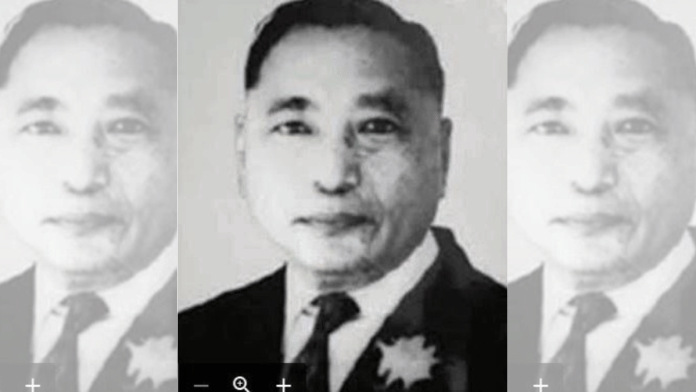New Delhi: A museum dedicated to Army officer-turned-bureaucrat Major Ralengnao ‘Bob’ Khathing was inaugurated Thursday by Defence Minister Rajnath Singh during his visit to Arunachal Pradesh’s Tawang.
Singh also unveiled a statue of India’s first home minister Vallabhbhai Patel in the border district, which is close to the Line of Actual Control (LAC).
A Naga from Manipur, Khating is best known for his expedition to the remote region of Tawang in 1951 that paved the way for its integration with the rest of India.
Later, he served as Indian ambassador to Myanmar from 1972 to 1975. The Naga officer was decorated with Military Cross (MC), Member of the Most Excellent Order of the British Empire (MBE), and later with Padma Shri in 1957. Khathing became the chief secretary of Nagaland in 1967.
ThePrint looks at the story of Major Khathing, a soldier, bureaucrat as well as diplomat whose Tawang exploits are stuff of folklore in the Northeast, especially in Arunachal Pradesh.
The daring expedition
As has been brought about in the book, ‘Major Bob Khathing: The Profile of a Nationalist Manipuri Naga’, by Lt. Col. H. Bhuban Singh, China officially declared Tibet as its own in 1949. Two years on, it annexed Tibet.
Khathing, who had served in the Assam Rifles, was made the Assistant Political Officer (APO) after he joined the Indian Frontier Administrative Service (IFAS), which was created to administer North East Frontier Agency (present day Arunachal Pradesh) and later some parts of the region.
At that time, Tibetans arrived in India in large numbers through various routes to escape Chinese rule and tyranny in their land. The British Indian government had attempted to extend its administration up to Tawang, but never met with success.
Jairamdas Daulatram, the then governor of Assam, ordered the Naga officer to occupy Tawang and extend Indian administration till there. According to Lt. Col. Singh, Khathing was to establish an advanced administrative headquarters at Tawang and stay there.
Sela Pass at the time “was a windy, barren, desolate, bitterly cold and God-forsaken place”, writes Lt. Col. Singh.
He further writes that unlike the road to Tawang today from Bhalukpong at foothills, passing through Tenga valley, Bomdila and Sela in 1951, there was no such connectivity back then.
In January 1951, the Tawang expedition party set out to do their job. In the harshest of conditions presented by lack of connectivity and the environment, the team led by Khathing journeyed from one point to another.
Before the development of Bomdila, the most important township in the area was Dirang Dzong, Lt. Col. Singh mentions.
“Because of the existence of a salt spring, the town attracted some population. It had a few administrative set-up as well. So Bob and his party dug their heels and prepared themselves for observance of the second Republic Day Celebration. So, the 25th of January was spent preparing for it…Bob hoisted and saluted the tri-colour flag on the morning of 26 January 1951 at Dirang Dzong, before a sizeable gathering of Army and Assam Rifles personnel, civilian government officials and curious locals,” he wrote.
In their forward journey, when the party reached Senge Dzong, the majestic Sela peaks could be seen. “Sela, at an altitude of about 14,000 feet presented the problem of a rarefied atmosphere,” the author mentions. Due to lack of oxygen, the party had to stop every “one hundred yards” to gain breath as the climb was “steep and slippery”.
Finally, in February 1951, the party reached Jang village. Khathing, upon arrival, spoke to the headman there. It was with his and village elders; help that two villagers were dispatched to Tawang to inform its residents of Tawang about Indians in the area.
Simultaneously, he sent messengers to the surrounding villages and called the headmen and elders to Jang.
“While his men entrenched themselves firmly at Jang, Bob carried out diplomatic parleys with the elders. He also made sure that his party did not deprive the villagers of their meager resource of food, on the other hand, the local populace benefitted from the liberal leakage of supplies brought by the Indian contingent,” Lt. Col. Singh writes.
The supplies included tinned food, sugar, salt and cigarettes, which were popular among the villagers.
Village elders of Rho, Changda, Jang and several adjoining villages were urged to not accept orders from the Tsona Dzongpen of Tawang, who as representative of Lasha (Lhasa), ruled the area, he writes.
Apart from Tawang’s cultural and spiritual affinity, it was important to Lhasa because it was the birthplace of the sixth Dalai Lama, Tsangyang Gyatso. However, since it fell south of McMahon Line, as successor to the British Indian Empire, India was well within its rights as per the Simla Agreement to claim it.
When he visited Tawang, Khathing, along with his troops, reached from campsite to the meeting place. “His one hundred riflemen formed a box completely encircling the high-ground, a reminder of pre-Napoleanic battle formations. On instruction from Bob, Captain Hem Bahadur Limbu ordered ‘fix bayonet’ to his troops. One hundred ‘click’ sounds of bayonets coming in unison seemed to say ‘we are even ready for blood’,” Lt. Col. Singh writes.
Khathing held court for the crowd which included some elders and leaders as also women and children. He conveyed to them that they should not have any apprehension about any interference in their monastic rituals and functioning, writes Lt. Col. Singh.
He told them that the Constitution of the new Republic of India tolerated religious freedom and even godlessness and irreligiousness, and as Indians, they would enjoy the same rights and privileges as enjoyed by others.
On 14 February, he moved his administrative headquarters to the permanent site he had selected. Once the task was accomplished, Governor Daulatram informed about his order to Prime Minister Jawaharlal Nehru.
(Edited by Tony Rai)






